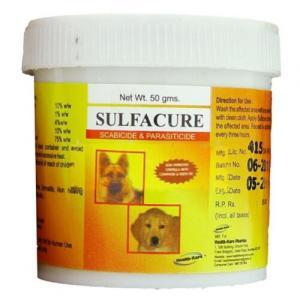Table of Contents
Caring for a dog’s skin is crucial for their health. Healthy skin is a protective barrier, prevents infections, and maintains comfort. Skin problems can signal underlying health issues. Regular grooming, proper nutrition, flea and tick prevention, and skin inspections are essential.

What Is Sulphacure (Sulphur, Camphor, Neem, Minerals)?
Say goodbye to skin troubles like scabies, Seborrheic Dermatitis, acne, and more with the powerful antifungal and antibacterial effects of Sulfacure. This skin savior combats fungal infections, eases eczema and itching, and conquers infections in tricky areas like armpits, neck, waist, thighs, and under thighs.
Ingredients
Sulfacure for pets is a topical treatment for various animal skin issues. It contains several active ingredients known for their therapeutic properties.
Sulfur: Sulfur is a well-known element with antimicrobial and antifungal properties. In Sulfacure, sulfur is used to combat bacterial and fungal skin infections in pets. It can help treat conditions such as dermatitis, mange, and ringworm.
Camphor: Camphor is a natural compound derived from the wood of camphor trees. It has soothing and cooling properties and is often used to relieve itching and irritation on the skin. In Sulfacure, camphor can relieve pets suffering from itchy skin due to various causes, including allergies and insect bites.
Neem Oil: Neem oil is derived from the seeds of the neem tree and has powerful antibacterial, antifungal, and anti-inflammatory properties. It effectively treats various skin conditions in pets, such as eczema, hot spots, and minor wounds. Neem oil in Sulfacure helps promote skin healing and reduces inflammation.
Minerals: While the specific minerals used in Sulfacure may vary, some formulations include minerals like zinc and copper. These minerals play a role in maintaining healthy skin and promoting wound healing. Zinc, for example, is known for its role in skin repair and immune support, making it a valuable addition to pet skincare products.
When combined, these active ingredients in Sulfacure work synergistically to address common skin problems in pets, such as itching, inflammation, infections, and minor wounds.
How to Use
The specific instructions for applying Sulfacure may vary depending on your veterinarian’s recommendations.
Before applying Sulfacure, clean the affected area of your pet’s skin with a mild, pet-friendly cleanser or warm water and a gentle soap. Gently pat the area dry with a clean, soft towel.
Carefully read the product label and any instructions provided by your veterinarian. Pay attention to the recommended dosage and frequency of application.
Apply a thin layer of Sulfacure directly to the affected area using clean hands or a disposable glove. Be sure to follow the recommended amount specified on the product label. Avoid applying it to healthy skin.
Depending on the veterinarian’s instructions, gently massage or rub the Sulfacure into the skin. This helps ensure the product is evenly distributed and reaches the affected area.
After applying Sulfacure, wash your hands thoroughly with soap and water to avoid accidentally transferring the product to your skin or eyes.
Keep an eye on your pet after applying Sulfacure. Some pets may try to lick or scratch the treated area. If this happens, consider using an Elizabethan collar or another method recommended by your veterinarian to prevent your pet from irritating the area. Monitor your pet’s progress over time. If you don’t see improvement within a reasonable timeframe or if the condition worsens, consult your veterinarian for further guidance.
Important Safety Information for Pet Owners
Consult your veterinarian before using Sulfacure or any topical treatment on your pet’s skin. They can accurately diagnose your pet’s condition, recommend the appropriate treatment, and provide specific guidance on using Sulfacure safely. Always adhere to the recommended dosage and application instructions provided by your veterinarian or as indicated on the product label. Using too much or too little can impact the treatment’s effectiveness and safety.
When applying Sulfacure, avoid contact with your pet’s eyes, nose, and mouth. If accidental contact occurs, rinse thoroughly with clean water and seek veterinary advice if irritation persists. After applying Sulfacure, wash your hands thoroughly with soap and water to prevent accidental ingestion or contact with your eyes.
Some pets may try to lick the treated area. To prevent ingestion, consider using an Elizabethan collar or other methods recommended by your veterinarian. Ingesting Sulfacure or similar products can be harmful.
Keep an eye on your pet for any signs of allergic reactions, such as redness, swelling, itching, or hives, after applying Sulfacure. If you suspect an allergic reaction, discontinue use and consult your veterinarian.
Dispose of any empty containers or used applicators in a responsible manner according to local regulations. Please do not leave them where your pet can access them.
If you have any concerns or questions about using Sulfacure or if your pet’s condition worsens or doesn’t improve with treatment, contact your veterinarian promptly.
Veterinarian Prescription
The need for a veterinary prescription to purchase Sulfacure or any similar medication for your pet depends on your country or region’s specific formulation and regulations. Sulfacure may come in different forms, including over-the-counter (OTC) topical treatments and prescription-strength versions.
To clarify the specific requirements for purchasing Sulfacure in your area, including whether a prescription is needed, contact your local veterinarian or check with your country’s regulatory authorities for pet medications. Regulations can vary by location, so it’s essential to be informed about the requirements in your region.
Interactions
Interactions with Sulfacure can occur when used with other medications, treatments, or substances. It’s essential to be aware of potential interactions to ensure the safety and effectiveness of your pet’s treatment. Here are some key considerations regarding interactions with Sulfacure:
- Medication Interactions: Inform your veterinarian about all your pet’s medications, including prescription drugs, over-the-counter medications, supplements, and herbal remedies. Some medications may interact with Sulfacure, potentially reducing its effectiveness or causing adverse effects.
- Topical Products: Be cautious when simultaneously using multiple topical products on your pet’s skin. Using multiple treatments can increase the risk of skin irritation or adverse reactions. Consult your veterinarian before combining Sulfacure with other topical treatments.
- Allergy and Sensitivity: Some pets may be sensitive or allergic to specific medications or ingredients. Inform your veterinarian if your pet has a history of allergies or adverse reactions to medications or topical treatments. This information will help your vet choose the most suitable treatment for your pet.
- Food and Diet: Although interactions between Sulfacure and food are less common, ensuring that your pet’s diet does not interfere with the medication’s absorption or effectiveness is essential. Discuss your pet’s diet with your veterinarian if you have concerns.
- Medical Conditions: Certain conditions in your pet may affect how their body processes medications. Inform your veterinarian of any pre-existing medical conditions your pet has, as these may influence the treatment choice and the potential for interactions.
- Pregnancy and Lactation: If your pet is pregnant or nursing, consult your veterinarian before using Sulfacure or any other medication. Some medications can pose risks to developing fetuses or nursing offspring.
- Environmental Factors: Consider environmental factors such as exposure to sunlight or extreme temperatures. Some medications, including certain topical treatments, can become less effective or cause skin sensitivity when exposed to direct sunlight or extreme heat.
To minimize the risk of interactions and ensure your pet’s safety, always follow your veterinarian’s recommendations regarding using Sulfacure. They will consider your pet’s health status and potential interactions when prescribing and advising on the medication.

Side Effects
Sulfacure, like any medication, may have potential side effects in some pets. You must know these side effects and monitor your pet while using the medication. If you notice any adverse reactions, contact your veterinarian for guidance. Here are some potential side effects associated with Sulfacure or similar medications:
- Skin Irritation: The most common side effect is localized skin irritation at the application site. This may include redness, itching, burning, or mild discomfort. It’s essential to follow the recommended dosage and application instructions to minimize the risk of skin irritation.
- Allergic Reactions: Some pets may be allergic to Sulfacure or its ingredients. Signs of an allergic reaction can include swelling, hives, rash, difficulty breathing, or other signs of distress. If you suspect an allergic reaction, discontinue use and seek immediate veterinary attention.
- Dryness or Flakiness: In some cases, Sulfacure may cause dryness or flakiness of the skin at the application site. This is generally mild and temporary but should be monitored.
- Increased Itching: Paradoxically, some pets may experience increased itching or irritation after initially using Sulfacure. This can occur before the medication begins to take effect. If the itching persists or worsens, consult your veterinarian.
- Discoloration of Fur: Some topical treatments, including Sulfacure, may temporarily discolor the fur or leave a residue on the coat. This is usually cosmetic and not a cause for concern.
- Stinging or Burning Sensation: A mild stinging or burning sensation at the application site can occur, especially if the skin is broken or irritated before application. This usually subsides quickly.
- Systemic Effects: While rare, systemic effects are possible if a pet licks or ingests Sulfacure. These effects may include gastrointestinal upset, vomiting, or diarrhea. To prevent ingestion, take precautions to prevent your pet from licking or scratching the treated area.
It’s important to remember that not all pets will experience side effects when using Sulfacure, and many tolerate the medication well. If your pet experiences severe or persistent side effects or worsens their condition while using Sulfacure, contact your veterinarian promptly.
Overdose
An overdose of Sulfacure or any medication can harm your pet. Overdose symptoms can vary depending on the medication and the amount of ingested or applied. If you suspect your pet has been exposed to an overdose of Sulfacure, it’s essential to take prompt action:
- Contact Your Veterinarian: Call your veterinarian immediately to report the situation. Please provide them with as much information as possible, including the type and amount of Sulfacure your pet was exposed to, when the exposure occurred, and any symptoms your pet exhibits.
- Observe Your Pet: While waiting for guidance from your veterinarian, closely monitor your pet’s condition. Look for signs of overdose, which may include:
- vomiting;
- diarrhea;
- excessive salivation;
- tremors or seizures;
- difficulty breathing;
- rapid heartbeat;
- agitation or restlessness;
- weakness or lethargy
3. Do Not Attempt Home Remedies: Avoid attempting to induce vomiting or administer any home remedies without specific instructions from your veterinarian. The appropriate treatment for overdose will depend on the specific circumstances and the extent of exposure.
4. Seek Emergency Care: In cases of severe overdose or if your pet exhibits severe symptoms, immediately contact an emergency veterinarian or animal poison control hotline. They can guide the appropriate steps and may recommend bringing your pet to an emergency veterinary clinic for evaluation and treatment.
5. Prevent Future Overdoses: To prevent accidental overdoses in the future, store all medications, including Sulfacure, securely out of your pet’s reach and follow dosing instructions carefully. Be cautious when applying topical medications to ensure your pet does not lick or ingest them.
Remember that the specific response to an overdose can vary depending on the individual pet, the amount ingested or applied, and other factors. It’s always best to err on the side of caution and seek veterinary guidance when in doubt. Timely intervention is crucial to minimize the potential harm caused by an overdose of medication.
Storage
In most cases, Sulfacure should be stored in a cool, dry place away from direct sunlight, extreme temperatures, and moisture. Heat, humidity, or sunlight exposure can affect the medication’s stability and potency.
Store Sulfacure and all medications out of the reach of children and pets. Pets, in particular, may be curious and could chew on or ingest medication containers.
Ensure the product’s container is tightly sealed after each use to prevent moisture and air from getting inside, affecting the medication’s quality.
Keep the medication in its original packaging to help protect it from external factors and retain important information such as expiration dates and instructions.
Keep Sulfacure away from areas where you store pet food, treats, or other supplies to prevent accidental mix-ups.
While Sulfacure should be kept cool, it should not be frozen. Freezing can alter the medication’s consistency and effectiveness.
When Sulfacure reaches its expiration date or if you have unused medication, follow local regulations and guidelines for proper disposal. Please do not dispose of medications in the trash or flush them down the toilet unless specifically instructed to do so by the manufacturer or local authorities.
FAQ
What is Sulfacure, and what is it used for?
Sulfacure is a topical medication used for various skin issues in pets, such as bacterial and fungal skin infections, itching, and irritation.
How do I apply Sulfacure to my pet’s skin?
Clean the affected area, apply a thin layer of Sulfacure, and follow the dosage and application instructions provided by your veterinarian or on the product label.
Can I use Sulfacure on open wounds or broken skin?
It’s generally not recommended to apply Sulfacure to open wounds.
Can Sulfacure be used on cats and dogs alike?
Sulfacure formulations may differ for cats and dogs. Always use the specific product formulated for your pet’s species, and consult your veterinarian.
What should I do if my pet licks or ingests Sulfacure?
Contact your veterinarian immediately if your pet ingests Sulfacure. They can provide guidance based on the situation and your pet’s size and condition.

































